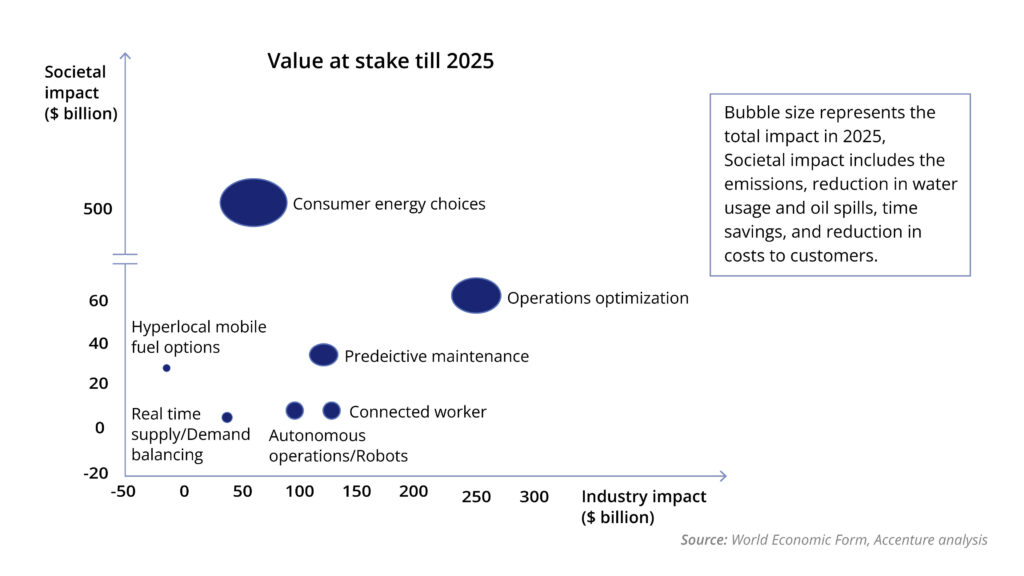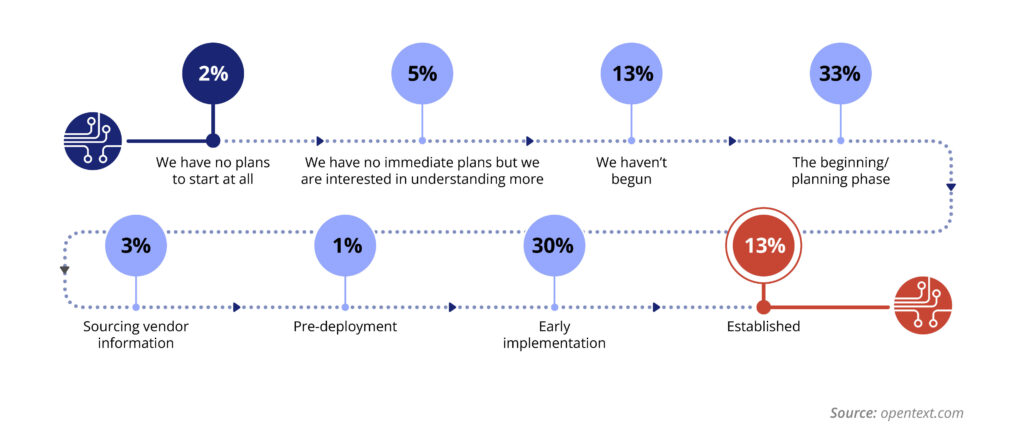From exploration and refining to distribution, the oil and gas value chain demands the highest levels of reliability, efficiency, and sustainability. Amidst rising costs, price fluctuations, and geopolitical challenges, industry leaders are recognizing the need to adopt digital transformation as a strategic priority. By leveraging digital technologies, oil and gas enterprises can reduce energy production costs, optimize asset productivity, and minimize energy consumption.
Take upstream and downstream companies, for instance; digital technologies can help them potentially reduce capital expenditures by up to 20%.
Beyond economic benefits, digital transformation is an existential necessity. A global survey by Tech-Pro found that 70% of companies have already implemented or are actively developing digital transformation strategies. Without digitization initiatives, companies risk struggling to attract the capital and talent essential for future growth.
The rewards are substantial: executives report a 40% increase in operational efficiency, a 36% faster time to market, and a 35% better alignment with customer expectations.
What is Digital Transformation in Oil & Gas Industry?
Digital transformation in the oil and gas industry involves integrating technologies like cloud services, automation, IoT, and analytics across different business functions. This shift changes how energy companies operate and serve customers, from the oilfield to the gas pump, leading to more efficient operations and better customer experiences. The main goals include improving efficiency, increasing employee productivity, promoting sustainability, reducing risks, and enhancing experiences for customers and partners.
How is digital transformation reshaping the oil and gas industry?
Oil and gas digital transformation drives efficiency, safety, and smarter decision-making. Enterprises leverage advanced analytics for actionable insights and use AI to analyze operational data, predict equipment failures, and reduce downtime. Automation streamlines routine tasks, boosting productivity, while cloud and edge computing enable real-time monitoring, collaboration, and supply chain optimization. Modernizing legacy systems eliminates disparate environments, allowing better use of cloud-native solutions for scalability and agility. These advancements empower oil and gas companies to enhance operations, meet evolving energy demands, and address challenges like maintenance, fluctuating markets, and regulatory compliance.
Boosting Resilience in Oil and Gas with Technology Transformation

Digital technologies in the oil and gas sector offer significant cost savings potential. In the upstream sector, tech-driven advancements in exploration, drilling, and condition-based maintenance can enhance value by over $5 per barrel. Downstream, hydrocarbon optimization and supply chain digitization can save more than $1 per barrel while boosting profitability. Additionally, these technologies can reduce capital expenditures by up to 20% and decrease upstream operating costs by 3-5%, delivering considerable value to the industry (McKinsey).

Here are a few ways digital innovation benefits oil and gas companies:
- Managing Price Volatility: Digital oil and gas solutions can help oil and gas companies navigate unpredictable price fluctuations. By leveraging data analytics and artificial intelligence to model pricing scenarios, companies can forecast supply and demand, enabling more informed decision-making.
- Supporting Change Management: Digital solutions enhance flexibility by connecting data, communication systems and project management platforms on shared networks. Predictive analytics can also monitor early signs of change, allowing leaders to proactively adjust strategies and manage transitions effectively.
- Accelerating Carbon Reduction: Digital innovation can help oil and gas companies reduce carbon emissions. Energy efficiency measures can potentially lower scope 1 and 2 carbon emissions by around 20%.
How digital technology is transforming the oil and gas industry?
Digital technology transforms processes across upstream, midstream, and downstream operations, optimizing exploration, production, and distribution in the oil and gas industry. AI and machine learning accelerate seismic data analysis, enabling faster identification of resource-rich areas. IoT devices monitor equipment health, reducing maintenance costs and preventing disruptions. Blockchain enhances supply chain transparency and simplifies transactions, while robotics and drones improve safety through automated inspections in hazardous environments. Digital twins enable operators to simulate and optimize facility performance. These technologies drive operational efficiency and support sustainability goals by minimizing waste and reducing energy consumption.
Navigating Oil and Gas Digitalization Challenges

Despite the potential benefits, companies in the oil and gas sector are not yet rushing to adopt digital transformation. According to Harvard Business Review, the oil and gas industry spends less on digital transformation compared to other sectors. The situation is even more concerning when it comes to digital assets, with the oil and gas industry ranking near the bottom. What’s holding them back?

- Timing: Oil and gas projects are capital-intensive and take a long time to develop. Once a project is approved, the focus shifts to executing the design rather than making changes. This long timeline can make it challenging to integrate new digital technologies mid-project.
- IT Support Infrastructure: Although many digital technologies are available, operators often lack the necessary IT support infrastructure to utilize them effectively. Implementing these technologies requires a skilled workforce, which can be a significant hurdle.
- Lack of Supply Chain Integration: Digitalization in the oil and gas industry is often tailored to the specific needs of individual subsectors due to limited vertical integration among companies. This lack of comprehensive supply chain integration can hinder broader digital transformation efforts.
- Compliance & security: As oil and gas companies transition to digital operations, they face the challenge of maintaining compliance with diverse regulations while protecting against cyber threats. With global operations, adhering to varying regional rules is essential, especially in sectors like offshore drilling, where environmental regulations are stringent. The risk arises when new digital tools overlook these rules, leading to costly errors and potentially damaging long-standing trust.
- Realizing Business Value: Securing stakeholder buy-in in oil and gas requires a strong, data-driven business case, but challenges arise in tracking use cases and demonstrating ROI under tight deadlines. Varying levels of digital maturity across business units can further complicate collaboration and value realization.
Do oil and gas companies need a holistic approach to digital transformation?
A holistic approach to digital transformation is essential for oil and gas companies to achieve long-term benefits. Siloed or piecemeal adoption of digital tools can lead to inefficiencies and missed opportunities. An integrated strategy enables seamless data sharing across departments, fostering better collaboration and informed decision-making. By aligning technology investments with business objectives, companies can address industry challenges, such as cost pressures and environmental concerns. Prioritizing workforce training ensures employees can adapt to new tools and workflows. This also helps companies remain competitive by enabling scalable solutions and continuous innovation.
A Roadmap for Digital Success in Oil and Gas

Oil and gas companies face digital transformation challenges just like other industries, but these challenges are shaped by their unique operational contexts. To accelerate their digital transformation journey, oil and gas companies should adopt key practices and tools, including breaking down data silos, cultivating a culture of innovation, leveraging advanced analytics, and forming strategic technology partnerships.
- Adopt Cloud-Native Solutions: Adopting cloud-native solutions is key to accelerating digital transformation in the oil and gas industry. Cloud platforms enable integration, data storage, and accessibility, allowing organizations to scale resources as needed, improve collaboration, and gain actionable insights from large datasets.
- Foster a Culture of Innovation: Creating a culture of innovation is crucial for digital transformation initiatives. Encouraging employees to adopt new technologies, collaborate, and engage in continuous learning drives efficiency and competitiveness. Adopting technology ensures sustained growth and keeps companies at the forefront of industry advancements.
- Crafting a Unified Digital Strategy: For oil and gas companies, a unified digital strategy across the organization maximizes benefits and efficiency. While specific business units may need tailored solutions, a coordinated approach ensures greater impact. Standardizing core technologies like cloud platforms and application development tools helps integrate and streamline operations across various teams and functions.
- Strengthen Cybersecurity Measures: As digital systems expand, robust cybersecurity measures are essential. Protecting the integrity, confidentiality, and availability of data safeguards operations from evolving cyber threats and ensures secure digital adoption.
What are the new technologies in oil and gas?
Advances in technology present significant potential for oil and gas companies to transform operations. From AI (traditional and AI agents), big data analytics, blockchain, to nanotechnology, these technologies can enhance exploration, optimize asset performance, streamline supply chains, improve safety, and boost equipment durability, all while driving efficiency and supporting sustainability goals.
Optimizing Operations with Digital Oil and Gas Solutions

Transform your operations with tailored oil and gas digital solutions. Boost efficiency with Intelligent Document Processing (IDP) and Robotic Process Automation (RPA). Gain actionable insights through advanced data integration and analytics, and seamlessly transition to scalable, secure cloud infrastructure. Address industry challenges with custom development and application modernization services, and automate tasks like visual inspections and asset tracking with our computer vision solutions to further reduce costs. Consult our experts to optimize your digital strategy.
Ready to embark on your digital transformation journey? Contact AppsTek Corp today to learn more about how our solutions can help your oil and gas business thrive.
Transform Operations with Digital Oil & Gas Solutions NOW!

About The Author
Rahul Sudeep, Senior Director of Marketing at AppsTek Corp, is a results-driven, AI-first B2B marketing leader with 15 years of experience scaling global enterprise SaaS companies. His expertise, honed at IIM-K, spans architecting high-impact go-to-market strategies, driving new market identification and positioning, and embedding Generative AI, LLMs, and predictive analytics into the core marketing function. Rahul unifies Technology, Sales, and Support teams around a single strategic hub, while also managing key Partner and Investor Relations. He leverages AI-driven insights to craft powerful brand narratives and hyper-personalized demand generation campaigns that drive measurable revenue growth and deepen customer engagement.






































